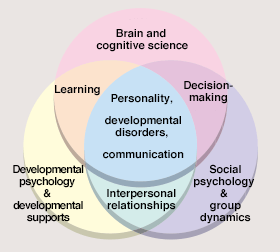Doctoral Program(Beginning April 2017)
Profile of those we wish to enlist in the Graduate School of Psychology
- 1 Individuals who aspire to become professionals in psychology and therefore have both a strong awareness of the related issues and the desire to acquire high levels of expertise and skill in the field.
- 2 Individuals who are eager to continue learning over a lifetime and are enthusiastic about contributing to society through examining various issues of psychology.
- 3 Individuals who aim to become professional researchers and have the requisite personal traits to carry out research based on empirical studies in diverse fields of psychology from a multi-faceted and comprehensive perspective.
Profile of those we wish to enlist in the Doctoral Program
- 1 Individuals who have a high level of professional knowledge in the field of psychology and can conduct advanced research using their expertise.
- 2 Individuals who can engage in both education and research that contribute to the development of psychological research from a wide range of viewpoints.
- 3 Individuals who wish to engage in the development of human resources contributing to the education of highly professional psychologists.
Major research topics in each laboratory
Brain and Cognitive Sciences
In the fields of brain and cognitive and sciences, the mechanisms of human intelligence have traditionally been studied. However, in the interests of gaining a more comprehensive picture, recent attention has turned to the mechanisms behind the integration of intelligence, emotion, and volition as well as their association with actions. Based on the progress in this research field, we hope to reveal the brain mechanisms of sophisticated communication functions and develop a theory of human communication. Furthermore, we also hope to discover the alteration process by studying such basic functions. This will reveal the pathological mechanisms underlying various disorders caused by disruption to the integration of intellect, emotion, and volition. In addition, based on our experimental and theoretical findings, we will consider psychological techniques for providing treatment of these disorders.
Staff: Jun Kawaguchi (professor), Toshio Inui (professor), Keiichi Onoda (professor)
Developmental Psychology and Developmental Support
Human development studies to date have mainly been restricted to the context of the humanities and social sciences, which cover psychology, medicine, and education. More recently, evolutionary studies, engineering, environmental science, and other areas, such as biology, cognitive science, and cognitive neuroscience, have become involved in developmental psychology. Interdisciplinary studies that may be able to provide broader views of human development are important; however, a new approach to clinical and developmental psychology, where the focus is on understanding individual development from a holistic perspective, is also becoming increasingly important. The aims of this research field are to address the themes associated with the individual psychological development of people as social beings who build interpersonal relationships from many angles. Our laboratories focus on developing the minds of individuals who have social relationships in their society through scientific and empirical research, with the ultimate aims of both exploring a scientific basis for developmental support and determining how to apply research findings to real-life situations.
Staff: Hideko Takeshita (professor), Hiroshi Toyota (professor), Mako Okanda (associate professor)
Social Psychology and Group Dynamics
It has been primarily focused on the relationship between individual behaviors and social environments in social psychology by examining the processes of interaction in terms of individual against individual, individual against group, and group against group. Due to recent advances in understanding unconscious mechanisms such as the neural mechanisms underlying human social behavior and the embodied cognition, social psychologists have begun to research the relationships between individual responses at a micro level and within personal relationships or group behaviors. Social psychologists also have begun to consider relationships between individual behaviors and their macro aspects by using frameworks for cultural psychology, behavioral economics, and social capital theory. Based on the paradigm shift in social psychology, we are trying to both reveal multi-layered interactions between individuals and society and construct a comprehensive theory about individuals and society in our laboratories.
Staff: Mitsuhiro Ura (professor), Yuji Kanemasa (professor)
 These three research laboratories, as shown in Figure 1 below, often address common themes and may also adopt shared methodologies. Therefore, all students receive research guidance under the terms of the curricula to 1) better understand the independence and commonality of their research, 2) acquire the highest level of professional expertise in a core discipline of their own choosing, and 3) develop a wide range of knowledge across multiple areas, along with the ability to comprehensively understand and integrate this information.
These three research laboratories, as shown in Figure 1 below, often address common themes and may also adopt shared methodologies. Therefore, all students receive research guidance under the terms of the curricula to 1) better understand the independence and commonality of their research, 2) acquire the highest level of professional expertise in a core discipline of their own choosing, and 3) develop a wide range of knowledge across multiple areas, along with the ability to comprehensively understand and integrate this information.





